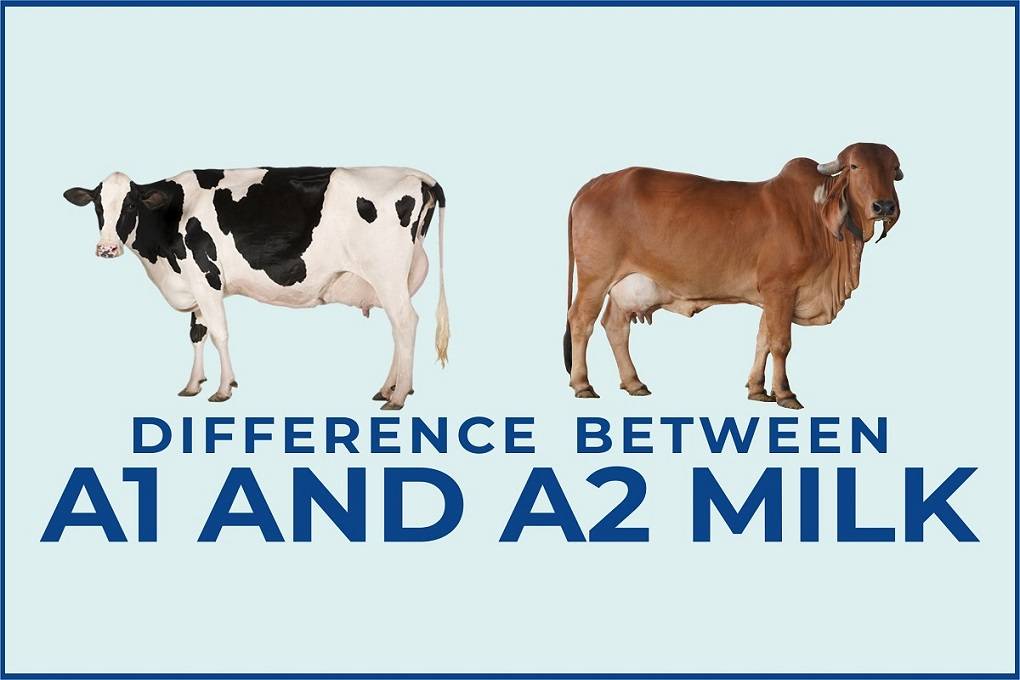
Children around the world have grown up drinking a glass of milk every day. Milk is an excellent source of calcium, an essential nutrient that is required by our body to make bones stronger and helps with blood clotting, and blood pressure regulation. Milk is also a rich source of vitamin B12, vitamin B2 or riboflavin, and vitamin B3 or niacin.
B vitamins are a vital vitamin necessary for healthy hair, the formation of red blood cells, and the normal functioning of the central nervous system. The milk industry is currently promoting A2 milk as a better and healthier choice of milk than regular A1 milk. This shift in the types of milk has happened because of numerous studies being conducted around the world that point toward the health risks associated with the consumption of A1 milk.
What is A1 milk? What is A2 milk?
Casein is a type of protein that constitutes up to 80% of the total protein content of milk. Casein provides the body with the amino acids necessary to help build muscle. It gets digested more slowly than other proteins. Therefore, it helps reduce appetite and increase feelings of fullness. A1 beta-casein and A2 beta-casein are two of the most common forms of casein present in milk.
While A1 beta-casein is present in the milk produced by cows that are bred in Northern Europe, A2 beta-casein is higher in the milk produced by cow breeds that originated in the Channel Islands and Southern France. Regular milk contains both A1 and A2 beta-casein but recently A2 milk has been introduced which only contains A2 beta-casein as many studies have suggested that A1 beta-casein is harmful.
Negative Claims Against A1 Milk
We must preface that the aforementioned are just some negative claims that are made against A1 milk. Further studies and research must take place to fully substantiate these claims.
-
Reduced Brain Function- In a research, conducted to study the impact of milk on brain function, researchers found that participants that were regularly consuming A1 milk took longer to process information and were prone to making errors than their A2 milk counterparts.
-
Digestive health- Although the amount of lactose present in A1 and A2 milk is the same, however, some people feel that A2 milk tends to cause less bloating than A1 milk. There are also studies that have shown that there are milk components other than lactose that also contribute to digestive discomfort. But at the same time, there is increasing evidence that points towards A1 beta-casein triggering inflammation in the digestive system.
-
Type 1 Diabetes- Type 1 diabetes is an autoimmune disease in which the immune system affects the body’s ability to produce and metabolize insulin properly. There are some studies that have linked a higher risk of developing type 1 diabetes with drinking milk at a young age. However, this claim has not been substantiated. Another research points towards the link between the amount of milk consumed by a child and their risk of developing type 1 diabetes.
Benefits of A2 Milk
A cup of A2 milk has 122 calories, 8 grams of protein, 5 grams of fat, 12 grams of carbohydrates, and 12 grams of sugar. It is also a rich source of protein, vitamins A, D, and B12, calcium, riboflavin, thiamine, and potassium. Consuming A2 milk regularly can keep your blood pressure healthy.
Since A2 milk is a rich source of omega-3 fatty acids, it can also potentially lower cholesterol levels. Drinking A2 milk regularly can positively impact our mood as it is a rich source of vitamin D, a vitamin that plays a key role in mood disorders such as seasonal affective disorder. A2 milk can also promote the health of the eyes because it contains vitamin A, which promotes the health of the retinas and corneas and even prevent cataracts.









